Lauren Winner has offered a short but pungent volume on the way central Christian “practices” are historically suffused with distortive, even abusive energies. Focusing specifically on eucharist, prayer, and baptism, she presents an argument that is pointed, deft, often elegant and always enlivened by injections of narrative energy and provocative conceptual summaries. Winner is a masterful writer on human manners: this is what people (and Christians here especially) are like, she tells us, offering us small portraits, etched with profound moral and theological suggestions, in way that might well impress virtuosos of ethical narrative like Iris Murdoch.
Winner’s purposes, though, go beyond suggestiveness to prescriptive analysis. Picking up a genre from the broad American religious tradition with which she is so familiar as a historian, Winner gives us a moral handbook, outlining not only how Christians can be more aware of, but can actually mitigate their damaging religious practices. But there is more as well: Winner wants to offer a sketch of why Christians do bad things, and going further, why all this can fit into a Christian worldview. So the book is a theodicy of sorts. It should be no surprise, however, that trying to do this in a modestly formatted volume of 180 pages will prove challenging, and in fact Winner succeeds more in her suggestive than in her prescriptive mode.
Winner’s broader argument is relatively straightforward. Christian practices are, like everything else human beings do, bound to the fallen world. But the fallenness of what we do is given in distinct ways, “characteristic” of the acts in question. Hence, specifically Christian practices are subject to their own peculiar deformities. Just as damaged books are characterized by a brokenness peculiar to books (cracked spines, or faded pages); or a bad novel, by those unhelpful, twisted or incomplete elements that make novels bad, every “good” has its corresponding perversion. Christian practices, like the eucharist, have characteristic goods. But they also have characteristic deformations—they “go bad” in peculiar ways—that engender specific evils. It is these special evils that Winner wants to sketch, and she urges Christians to be attentive to the peculiarities of what they do, so that they can also be aware of the peculiar ills to which their general human sinfulness must give rise.
This argument is not particularly novel, but it is aimed at a broad complacency in the face of perverted Christian practice shared by average church members and theologians alike. So—to follow the order of Winner’s discussion—she outlines how the sanctity of the eucharist’s substance and gathering gives rise to reactive panics about profanation and exclusion. Historically, these anxieties lie e.g. behind (or right at the center of) medieval anti-Jewish pogroms of host-desecration. When it comes to prayer, Winner carefully recounts how American slave owners’ petitionary requests to God, detailed in diaries, served to “manage” their emotions in ways that strengthened the frameworks of slave-owning and oppression. Caught in a web of habituated delusion, they could ask for the spirit of forgiveness in the face of “dishonest” slaves, even while seeking their subjects’ growth in the Christian virtues of abject obedience. All of our prayer has the “potential for distortion” (p. 63) Winner writes, as it both masks and furthers our deformed desires. Finally, baptism too is gripped by its own peculiar malformations.Christian practices are, like everything else human beings do, bound to the fallen world. But the fallenness of what we do is given in distinct ways, “characteristic” of the acts in question. Ideally both an “extraction” of the individual from the degeneracies of the local world and then a “superinscription” of these particularities into the larger world of God in Christ, baptism ends up, in the hands of Christians, lurching into the warping overemphases of one side or the other. In the evolved practice of “christening” in turn-of-the-century America, which Winner presents as a paradigm of distortion, the local gobbles up the cosmic divine, erasing the larger world of Jesus the Lord and of the Church catholic both. Baptism is literally domesticated in the cult of the family.
This is Winner’s larger story. And the antidote is a kind of embracive modesty: be aware, be humble. The eschaton is the only place where gifts are perfectly received in any case, and until then, take hold of God’s offerings—like eucharist and baptism—with thanks, but also with a with a “dual certainty” that we will use God’s gifts for good and ill (p. 154). In addition, fence your Christian practices around with remedial practices, like repentance and lament, activities that can themselves of course be deformed and damaged, but that are nonetheless necessary aspects of faithfulness in the face of the more general damage we do to God’s gifts.
Winner’s writing, when she focuses on her examples, is subtle. But her broader argument trades on the eschatological hope of God making everything right at some point, while meanwhile we are to tread carefully and suspiciously in everything we do here on earth. Humility and self-criticism will go a long way to “fix” our woeful hypocrisies; and God will, in any case, finally make it right. The fullness of hope lies in cherishing the way our inevitable missteps can be hemmed in, and then finally left behind. The cover of the book depicts what looks like a bowed African slave. The image itself, by the photographer Zelko Nedic, is from his series called “Golden Scars,” inspired by the Japanese artistic genre of Kintsukuroi, which elevates repaired artifacts to the status of a special beauty. The choice of the image may be meant to illustrate Winner’s take on the felix culpa tradition—the “fall” is “happy,” because it gave rise to Christ. In fact, though, Christ doesn’t make much of an appearance in the book, and there is little felicitas in the world to which he came, except as pressed into the distant eschaton. Until then, there is a quiet self-restraint on the part of Christians in particular.
What about this larger story itself? Is it a kind of contemporization of the great tale of human sin? “Nothing […] is untouched by the Fall,” Winner asserts at the opening of the book (p. 1). But she has particular targets in mind, it seems. Thus, she singles out those naïve “re-pristinators” who fill the ranks of “post-liberals,” theologians who have shifted their fantasies from the self’s refashioning to some sort of collective redemption put in place through the pursuit of thick “Christian practices.” In an Appendix, she names names: Stanley Hauerwas, Eugene Rogers, Sarah Coakley. There is a “curious optimism” and “magical thinking” to their promotion of energetically inhabited ecclesial practices, she says.The Church’s social frameworks and socially deployed artifacts are no panaceas for our social ills; and they can deflect Christian theologians from the hard work of (con)testable policy analysis. Putting the eucharist to “work” in an expansive way, they seem to believe it can even found an “alternative polis” to “late-capitalism” (p. 40). By contrast, Winner (who calls herself a “de-pristinator”) wants to warn us away from such enthusiasm. To this degree, though politically and ethically attuned, the book also aims at deflating the political pretensions of Christians, progressive and traditionalist both, regarding ecclesial efficacies. I am sympathetic! The Church’s social frameworks and socially deployed artifacts are no panaceas for our social ills; and they can deflect Christian theologians from the hard work of (con)testable policy analysis.
There is a way, however, that post-liberalism is exactly the framework from within which Winner is writing, if as an “inside” critic. Thus, it was George Lindbeck himself, the explicit font of post-liberal theology, who articulated his vision of the integration of Christian speech and act as a direct challenge to the sin of ecclesial division, which also became a challenge to alternative ways of getting at religious truth that, Lindbeck implied, were too prone to hypocrisy. Lindbeck pressed for a certain epistemic and institutional humility on the one hand, but also—if “pursued” vocationally—a stubborn openness to others, that is bound to constant self-revision in relation to them and to the unremitting press for an integrated Christian existence. Winner seems to be following Lindbeck’s lead here, though only part way. Humble self-revision need not be the same as constant indefiniteness, but that is something Winner appears at times to accept, a place where there is never any Yea or Nay from the mouth and hand of God, whether we can grasp it or not. Lindbeck, if he avoided this, did so by his deep scriptural fidelity and relentless insistence on carrying on with Christian practice in light of these Scriptures, their Lord, and their implacable judgments.
The thick (and messy) world of Scripture and its Lord is what Winner shies away from, in a way analogous to the moral quicksands of “practice.” Winner wants the eucharist—“preeminent and prevenient gift” (p. 46)—to be wrenched from its practical sphere into that of “pure gift” (p. 140). Gifts are perverted by turning them into practices bound to the extended habits of human sin. The assertion begs the question of what a “pure gift of God” is, what characterizes it, how it “works,” and so on. These are not deforming questions, though it seems that Winner thinks they are. She stresses, for instance, that a true gift has no “reciprocation.” It “just is.” “Practices” always end up turning pure gifts into our self-projections. Maybe. But the entire Bible is about “response” to divine gifts (and human gifts too), at the least in terms of “thanksgiving” (cf. Jesus and leper), a thanksgiving that is extended into covenant, obedience, and sacrifice. Calvin was not scripturally tendentious to frame his catechisms in these terms. Jesus, in John 6, uncovers a range of elements bound up with the giftedness of his own flesh and blood: coming, believing, receiving, eating, abiding, each of which is tied, through Jesus’ own figural discourse here and elsewhere, to ingesting the Word of God, i.e., the Torah and the pneumatic speech of the prophets among other things. If there is such a thing as a “pure gift” from God, it seems that it is always a gift that is practically and spiritually ramified. Hence, the gifts of God—the Law, the Commandments, Spirit even—come to us as complex enactments and engagements bound to a network of intersecting lives, which the Scriptures present as reality-constructing. But gifts they are, in just these terms and not apart from them.
In the face of this, Winner’s large theodical program, based on isolating Christian practical perversions, seems too stunted. Winner wants to keep human sin in its own container, quite separate from the purposes of God. Sin is simply what beings “with agency” do.Winner’s large theodical program, based on isolating Christian practical perversions, seems too stunted. People do bad things, and Christians do bad things because they are people. But bad things, and people themselves, tell us little about God, Winner implies; and God has little say to bad people other than “stop” and “I will somehow and at some point make it better.” God has a “program of healing and redemption,” but that just means that God will in fact fix the mess we have made of our faith. This is certainly a kind of theodicy, and a common one. It is also a dispiriting version, because it solves the problem of evil by keeping human beings and their depredations (including Church in this case) far from God. If, Winner asserts (p. 15), bad things happen on the occasion of a meal—bandits swoop down, there is a tornado—that is not the meal’s fault. But what the diners do to each other at the meal—and that includes Christians at the eucharist—that is all their fault.
That can’t be right. Not only does it sanitize God, but it offers a thinly brittle sense of life. We can think of Job, and how intrinsic and extrinsic evils are all mixed up in this story, in a way that seems to include God himself. That is precisely what the Book of Job, and its horrendous opening of bandits, fire, and wind destroying his family with a random abandon, seems to be about: neither diners, nor marauders, nor God can be easily broken down into discrete moral agents, within an easily evaluated moral realm. Humility and self-criticism cannot protect Job, or anybody else. Indeed, the whole of Job is about how we cannot finally construct a God of moral externalities; at the same time, we cannot seal off “damaged gifts” from their Giver, something Winner’s final chapter tries very hard to do, in the process leaving God’s gifts dangling in the hands of infantile and often brutalizing Christians.God comprehends the breadth of human evil and makes it his own, in ways that break our hearts and remake them at once.
How are we then to know when a gift from God is “pure” and what keeps it so? What is our comparative test? One could speak of God’s own “practices” in this case, ones that, in just this complex matrix of pressured common life, are given form in the body of Jesus, in his sacrifice and forgiveness. Christ is the Law, the Covenant, the Baptism, the Body and Blood, the prayers uttered. In this way, Christian practices are always answerable to their antitype. But because Christ is antitype, he is not distant but very present in the type: he is himself engaged in the “Fall,” in sin and its “damage,” practices and all; he “enters” it, “bears” it, “embodies” it, “becomes” it. Winner discusses the way that Judas’s presence at the Last Supper emphasizes the eucharist’s “deformation” from the start, and so we should approach it on that basis. Yes, but the deformity was—this is obvious in the Gospel accounts—divinely providential, planned, prophesied; and thus ordered and assumed by the Lord himself. God’s perfection willingly took on the deformity, from all eternity. It is not only that God brings good out of human evil; it is that God comprehends the breadth of human evil and makes it his own, in ways that break our hearts and remake them at once.
Winner’s book is a wonderful, and disrupting, avenue into honest thinking about what Christians do in the world. But because it is less interested in what God does there with them, it only gets halfway into the problem.
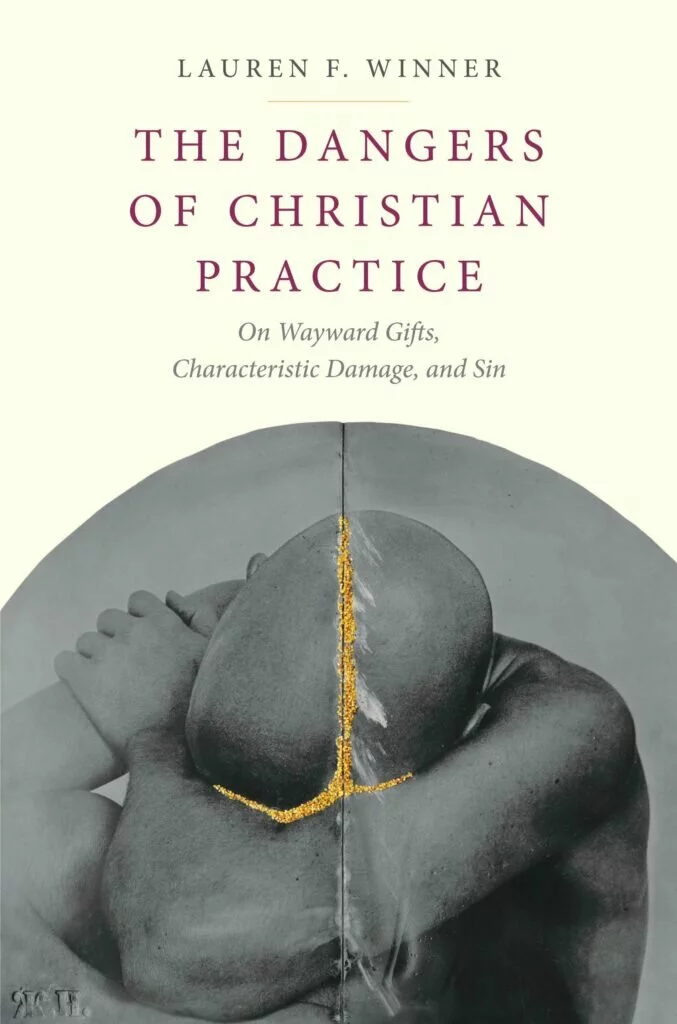
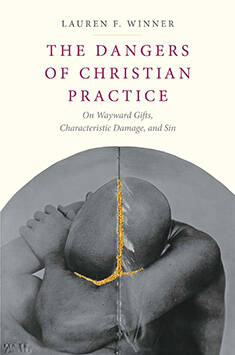

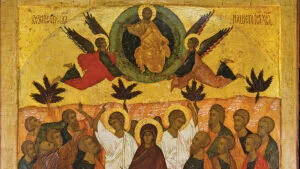

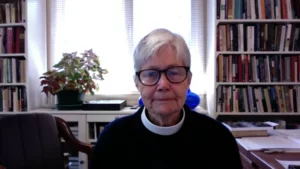

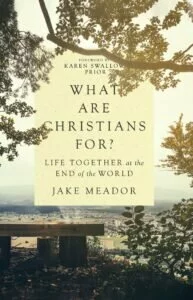
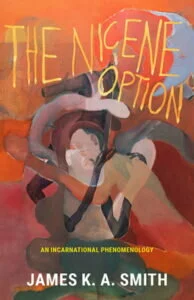
Comments
Be the first one to make a comment!